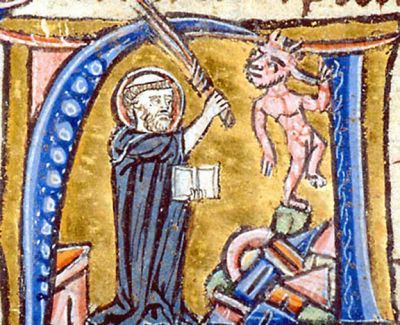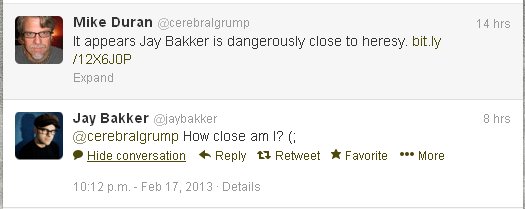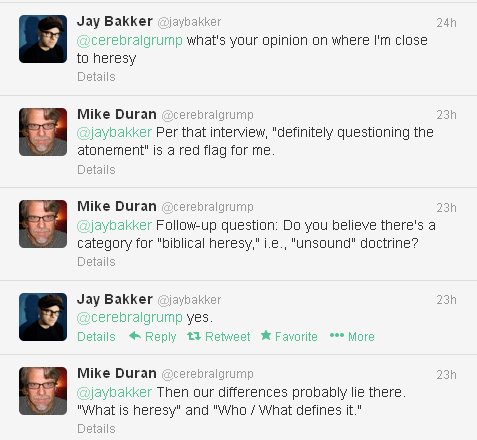The title of Jay Bakker’s forthcoming book is Faith, Doubt, and Other Lines I’ve Crossed. Doubt is a well-worn (if not tired) subject among religious  progressives. But it’s the reference to crossing “lines” that I find ironic, mainly because erasing lines, not reinforcing them, appears closer to the postmodernist’s intentions.
progressives. But it’s the reference to crossing “lines” that I find ironic, mainly because erasing lines, not reinforcing them, appears closer to the postmodernist’s intentions.
You can’t cross lines that don’t exist. So blurring them becomes tactical to someone on the wrong side of the line.
However, in an interview with The Christian Post, Bakker references many such theological “lines” and, dare I say, toes them. For instance, in Jay Bakker Talks Faith, Doubt, and Where the Church Has Went Wrong, he admits:
“I am definitely questioning the atonement and trying to discover how we can see it in a different way. We’ve got this image of God who needs some sort of flesh, some sort of blood, that needs some sort of vengeance to pay for sin. My experience of a loving God who’s asked me to love my enemies – this isn’t a God that demands something before you are accepted. I think Jesus died because Jesus was inclusive. God is inclusive. I think that the idea of God somehow being separated from us was more man’s idea.” (bold mine)
Bakker’s statement — “I am definitely questioning the atonement and trying to discover how we can see it in a different way” — is just a sample of his rather free-wheeling, if not reckless, regard to some essential biblical doctrines. Let me be clear: It’s the stated intention to re-imagine biblical doctrines, not the questioning of those doctrines, that can be problematic. Asking questions is part of thinking critically. There’s no biblical doctrine that we should not think critically about. It’s when we arrive at the conclusion that a certain doctrine is wrong and needs to be seen “in a different way” that we should tread lightly.
Frankly, if Bakker was “questioning” something else, I wouldn’t be writing this post and using him as an example.
“I am definitely questioning the pre-trib rapture and trying to discover how we can see it in a different way”
“I am definitely questioning infant baptism and trying to discover how we can see it in a different way”
“I am definitely questioning speaking in tongues and trying to discover how we can see it in a different way”
“I am definitely questioning whether Adam had a belly-button and trying to discover how we can see it in a different way”
Problem is, Jay Bakker is questioning something that is central to the Christian faith — the Atonement.
I’ve always loved Augustine’s maxim,
“In essentials unity, in non-essentials liberty, in all things charity.”
It’s helpful, I think, to view Bible doctrines in terms of “essentials” and “non-essentials.” Libraries have been devoted to discussing Christian doctrine. But what doctrines are “essential” — essential to salvation, essential to being a Christian? Credo House does a good job categorizing Essentials and Non-Essentials. The author isolates five beliefs that many consider…
Essential For Salvation:
- Belief in God (there is no such thing as an atheistic Christian)
- Belief in Christ’s deity and humanity (1 John 4:2-3; Rom. 10:9)
- Belief that you are a sinner in need of God’s mercy (1 John 1:10)
- Belief that Christ died on the cross and rose bodily from the grave for our sins (1 Cor 15:3-4)
- Belief that faith in Christ is necessary (John 3:16)
Notice that the Atonement — that Christ died on the cross and rose bodily from the grave for our sins — is considered an essential. Nevertheless, this is the doctrine that Jay Bakker is “definitely questioning.”
Per Augustine, as regards essentials, we must seek unity. Not liberty. This is an important distinction. Why? We shouldn’t seek “unity in essentials” so we can be a bunch of clones regurgitating the same thing, but because salvation, ours and others, is at stake. Furthermore — and this gets missed in Augustine’s axiom — we shouldn’t give “liberty” to someone who is denying or deconstructing an “essential.” To do so would not be charitable. Nor can “unity” really be had without a defined “hub”.
By deconstructing and blurring what is “essential,” we make unity impossible. I mean, what are we uniting around?
This probably explains why the Bible is so adamant against false teachers and heresy. Listen to the apostle Peter:
“But there were false prophets also among the people, even as there shall be false teachers among you, who privily shall bring in damnable heresies, even denying the Lord that bought them, and bring upon themselves swift destruction. And many shall follow their pernicious ways; by reason of whom the way of truth shall be evil spoken of.” (2 Peter 2:1–2)
This is hardly the tone of a tolerant man. “Damnable heresies… denying the Lord that bought them.” Apparently, a “line” had been crossed that rankled the old man.
In fact, Scripture is full of warnings against false teaching and false teachers. Like Paul’s farewell to the church elders in Ephesus:
“Keep watch over yourselves and all the flock of which the Holy Spirit has made you overseers. Be shepherds of the church of God, which he bought with his own blood. I know that after I leave, savage wolves will come in among you and will not spare the flock. Even from your own number men will arise and distort the truth in order to draw away disciples after them. So be on your guard!” (Acts 20:28-31)
Question: Is this a posture Christians are still to have — being on guard against heresy and those who “distort the truth”?
So yesterday, after reading the aforementioned interview, I Tweeted the following. Somehow, it got back to Bakker.

Interestingly enough, some of my Facebook friends suggested I was being too gracious. Like John who commented, “Close to heresy? Seems like he’s already well over that line…” Anyway, Bakker and I had a brief, cordial exchange. (You can see the Twitter thread of that conversation HERE.) What I found most interesting is that he, apparently, agrees that there’s a category for “biblical heresy” and “sound doctrine.”

Which leads to the point of this post. If there is a line one crosses into heresy, knowing what and where that line is would seem of utmost importance. Moving the line, tampering with the line, much less crossing it, could have serious consequences. Now, I would love to have further conversation with Bakker about that line. It is encouraging to know he still acknowledges there IS a line into heresy and false doctrine one can cross. My guess is, however, that we would disagree about where it should be drawn and what it should demarcate. Obviously, he believes the Atonement is a theological line we should have “liberty” to redraw. And this, to me, is scary.
I cannot sit in judgment of people’s standing with God. That’s one reason I framed my initial question the way I did. “It appears Bakker’s dangerously close to heresy.” I didn’t say he crossed that line. And I believe it would take a lot for me to reach that conclusion.
But here’s the thing — I think Christians should heed the exhortations of Scripture, be on guard against false teachings and teachers, and, at some point, be willing to call them out.
If there is a line that people can cross into biblical heresy, as Bakker admits, then knowing where that line is drawn and what it demarcates is essential to the health of the Church.
Which leads to, perhaps, a bigger problem: Christians no longer share the same theological lines. More accurately, we no longer argue from the same point of authority. So the more we re-imagine what is “essential,” the more the definition of heresy changes. The more we tweak the lines, the harder it is to call anything false doctrine. And when all the lines are abolished, there will be no heretics.
This, I”m afraid, is the endgame of religious progressives.















The danger line for heresy has always been “Who do you say that I am? There is no ambiguity in 1 John as to what constitutes the line you are considering. The warnings are plain about those who “re-imagine” Christ humanity and divinity. John is pretty plain as well what God says about those who imagine they are not sinners. So my first step would be to ask Baker what he thinks of those two lines: the incarnation of Christ, very God and very man, and the innate sinfulness of man.
So who decides who’s a heretic and who isn’t? You? Shouldn’t we be more worried about loving each other than setting up doctrinal tribunals?
Jenna, I agree people shouldn’t rush to do so, but the idea that man has been separated from God, and Christ’s death atoned for our sins is central to Christianity. If you don’t believe in this, everything changes, to the point of it becoming a different religion.
A good example was Garry Willis. He’s a Catholic, and he just wrote a book called “Why Priests?” He doesn’t believe in things like that. There’s a name for people who don’t believe in them; Protestants. It was so bad that Stephen Colbert, not a conservative Catholic by any means, called him out on it. This is on that level.
Without the Atonement their is no Christianity.
In that interview, he seemed open about what he believes. The idea that no separation between man and God exists, and that such ideas are man-made, really contradicts the word of God.It also seems to me that he thinks Christ’s teachings, death and resurrection are revelatory rather atoning; they show us we were mistaken about separation, and give a path to live in a new way. I can’t say more from such a brief article, but what I did understand does make me worry.
I don’t know. I understand doubt and thought, even on core concepts, but if I were engaging doubt on something as foundational to Christianity as the atonement, I’d take a break or sabbatical from teaching the faith and get my head cleared up.
Mike, I’m with you until this paragraph:
‘I cannot sit in judgment of people’s standing with God. That’s one reason I framed my initial question the way I did. “It appears Bakker’s dangerously close to heresy.” I didn’t say he crossed that line. And I believe it would take a lot for me to reach that conclusion.’
This seems a bit wishy washy to me. I agree, God is the ultimate judger of souls, not me, therefore, it’s not my place to speculate on Bakker’s ultimate destination. But in terms of his theology and how it aligns with the Bible, I can judge, and I will. Or rather I will point to what D.M. said, “the idea that man has been separated from God, and Christ’s death atoned for our sins is central to Christianity. If you don’t believe in this, everything changes, to the point of it becoming a different religion. ” Yep.
I have a problem with people doubting and questioning. I do have a problem with people reinventing the gospel and then flying it under the banner of Christianity. This is clearly what Bakker’s doing, there’s no “dangerously close” about it.
As it is, Bakker is being intellectually dishonest to himself and his readers. There are plenty other “Jesus'” to follow (the “Christ conscience” for instance), and if Bakker wants to follow a different Jesus than the one in the Bible, it’s his choice. I’m not going to run about shouting “heathen” in his general direction.
We are free to choose and not to choose, but d@mn it, be honest about the path you are choosing. Don’t go around calling it something it’s not in an effort to get followers.
I hear you. It can sound wishy washy to be all concerned about heresy and then waffle on stating if I believe Bakker embraces it. Thing is, Jessica, I don’t know exactly what he believes. Until I do, I think it’s best not to pronounce judgment. Yes, there were plenty of red flags in his interview. As I said, he seems to be veering “dangerously close” to heresy. Until I hear more, I’ll stick with that for now.
“I **don’t** have a problem with people doubting and questioning.”
Major typo. Sorry.
Yes, what he believes specifically is important. But I think we have to examine it carefully and not just to see if it lines up with currently fundamental doctrine.
By that I mean, Paul talks about a time when sound doctrine will not be tolerated, love will grow cold, people will fall away from the faith. Meanwhile, Yeshua (and Moses for that matter) tell about a time of restoration. Truth has been lost and been regained in cycles in the past.
The point is, do we see ourselves as at the beginning of the falling away or at the beginning of the restoration? It shouldn’t be the litmus of heresy if it matches established doctrine it should be is this what the scripture says.
Did Christians ever share the same theological lines? It seems unlikely from what I know of history (although lines/borders have often been forced on followers). And, yes, I do believe strongly that we need to have boundaries in our faith, or Christianity will become meaningless. However, judging by Bakker’s paragraph, he’s doing a little dance: ooh, ooh, I’m stepping over the line; now I ‘m back; now I’m over. This is the way most heretics work (I’m not saying he’s a heretic!! I don’t know enough about him to make that claim). They throw right ideas and words in with weirdly wrong ideas and words and, after a while, it becomes difficult to separate the two if you aren’t a discerning person. Along with not making a claim that Bakker is a heretic, I also would never doubt his Christianity. I would only question his readiness to teach others, especially if he hasn’t come to terms with core doctrines such as the atonement. He also seems immature and image-oriented, judging by pictures. I would naturally not trust a teacher who looks as he looks. Sorry, call me shallow, but there it is. I don’t trust cool people.
Having an interesting twitter conversation (well, polite tweet-off, really) with Andy Meisenheimer ?@andymeisen on the confusion of the words God and love (me: God is love but that does not mean love is God; but it does according to Andy). I think this is a key point with emergent representatives – words don’t mean what they mean anymore. Doctrines are either redefined or cast aside if inconvenient.
I’m nominally acquainted with Andy, and I like the guy very much. But I find myself with the same dividing line. To say “love is God” is a bit like saying “the tree is God.” Simply because we see the mark of God’s character in creation, does not render the creation an extension of the divine.
And no different than saying mercy is God, or justice is God, etc… All assume our human understanding and definition of these attributes is perfect which it is not.
Lyn, FYI, Andy co-wrote Jay Bakker’s new book.
He’s not a very astute Greek student, then. He claimed in a tweet that John 4:24 “pneuma ho theos” means spirit is God. Casual Greek knowledge: the subject of the sentence is marked by the article and thus spirit is the predicate noun (with the verb “estin” omitted as it is frequently done in Greek).
“In essentials unity, in non-essentials liberty, in all things charity.”
Hey I thought that phrase was coined by Rupertus Meldinius during the 30 year war-not Augustine. Anyway, great article. Sometimes I think if we “critically” review doctrine, that can sometimes lead us into thinking our interpretation is better. Also I have noticed not everyone agrees on what is essential and non-essential.
I’m gobsmacked at that vast numbers of people in the “emerging”/”progressive”/”not your father’s Christianity” group who are Questioning The Atonement.
Look, be a Buddhist or whatever if you want to. But if you’re claiming Christianity, don’t try to do a fancy sort of gluten-free Christianity: “I’m Jesus Intolerant!”